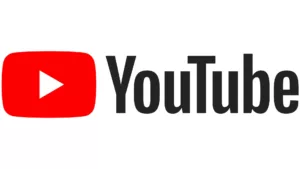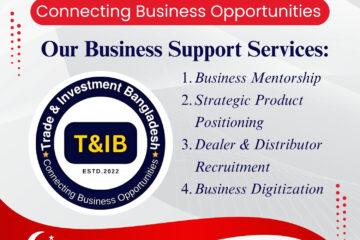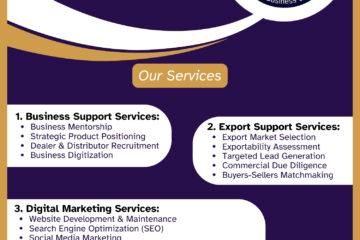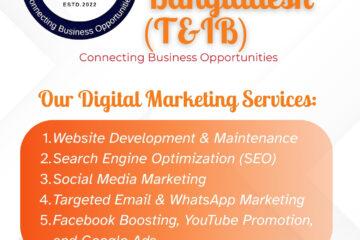Personal Branding with Digital Tools-1
Md. Joynal Abdin, BBA (Hons.), MBA
Founder & CEO, Trade & Investment Bangladesh
Introduction:
In the digital age, personal branding has evolved from a mere concept to a critical component of professional success. Personal branding involves the intentional and strategic presentation of oneself to the world, cultivating a unique and memorable identity that sets an individual apart in the professional landscape. It goes beyond a resume or a job title; it encompasses the values, skills, and personality that define a person’s professional persona.
Digital marketing tools play a pivotal role in shaping and amplifying personal brands. In an era dominated by online interactions, these tools provide individuals with the means to curate and disseminate their personal brand effectively. A profile website can present you to your stakeholders like, recruiters, business partners, suppliers, buyers, effectively to create a brand image. Social media platforms like LinkedIn, Twitter, and Instagram act as virtual stages where individuals can showcase their expertise, share insights, and engage with a global audience. Through these channels, professionals can craft a narrative that aligns with their personal brand, creating a consistent and compelling online presence.
Content creation tools are another cornerstone of personal branding in the digital age. Whether through blog posts, videos, podcasts, or visually engaging images, individuals can leverage various mediums to communicate their expertise and unique perspective. This content not only establishes credibility but also fosters connections with a diverse audience.
Search engine optimization (SEO) is a crucial aspect of digital personal branding. As individuals strive to be discoverable online, optimizing their websites, social profiles, and content for search engines ensures that they are easily found by those seeking their expertise. A well-optimized online presence contributes to building authority and visibility in one’s industry.
Email marketing, often overlooked in personal branding discussions, is a direct and personalized way to communicate with an audience. Building and nurturing an email list allows individuals to share valuable insights, updates, and exclusive content with a targeted audience, reinforcing their personal brand and fostering a community around their expertise.
In essence, digital marketing tools empower individuals to take control of their narrative, reach a global audience, and authentically communicate their personal brand. In a world where first impressions are often digital, leveraging these tools becomes not just an option but a strategic necessity in cultivating a powerful and influential personal brand in the digital age.
2.0 Understanding Personal Branding:
Personal branding is the intentional and strategic process of shaping and managing how an individual is perceived by others. It involves the creation of a distinct and memorable identity that sets a person apart in their personal and professional endeavors. Beyond a simple resume or job title, personal branding encompasses a holistic representation of one’s values, skills, expertise, and unique qualities.
The significance of personal branding lies in its ability to influence how others perceive and interact with an individual. In a competitive and interconnected professional landscape, a strong personal brand acts as a differentiator, helping individuals stand out amidst a sea of talent. It serves as a guide for how others perceive an individual’s professional identity, creating a cohesive narrative that resonates with target audiences.
A robust personal brand is a powerful asset in achieving professional success. It establishes credibility and trust, as a well-defined personal brand communicates a clear message about an individual’s expertise and what they bring to the table. Employers, clients, and colleagues are more likely to engage with someone whose personal brand reflects authenticity, consistency, and a genuine passion for their work.
Moreover, a strong personal brand contributes to increased visibility and opportunities. In a digital age where first impressions often occur online, a well-crafted personal brand can attract attention and create a positive impact, opening doors to career advancements, collaborations, and partnerships. It positions individuals as authorities in their respective fields, making them go-to experts sought after for their insights and contributions.
Additionally, a carefully curated personal brand fosters stronger professional relationships. By showcasing personality, values, and interests alongside professional achievements, individuals can connect with others on a human level. This connection goes beyond job titles and resumes, leading to more meaningful collaborations and networking opportunities.
In essence, personal branding is not just about self-promotion; it’s about creating an authentic and compelling narrative that aligns with one’s professional goals. A strong personal brand is an invaluable tool for navigating the modern professional landscape, helping individuals not only survive but thrive in their careers by making a lasting and positive impression.
3.0 Digital Marketing Tools Overview:
In the dynamic realm of personal branding, leveraging the right digital marketing tools is essential for crafting a compelling online presence. These tools span various categories, each playing a unique role in establishing and amplifying an individual’s personal brand. Let’s explore some popular tools categorized by their functions:
3.1 Profile Website Builders: WordPress, Known for its flexibility and user-friendly interface, WordPress is a versatile platform for building a personal website. With a variety of themes and plugins, users can showcase their expertise, achievements, and portfolio with ease.
3.2 Social Media Management: Hootsuite, a comprehensive social media management platform that enables users to schedule posts, engage with followers, and track social media performance across multiple platforms from a single dashboard.
3.3 Content Creation: Canva, a user-friendly graphic design tool, Canva allows individuals to create visually appealing graphics, presentations, and social media posts without the need for extensive design skills.
3.4 Analytics and Insights: Google Analytics, a powerful tool for analyzing website traffic, user behavior, and other key metrics. It provides valuable insights into the effectiveness of a personal website and online content.
3.5 Email Marketing: Mailchimp, an email marketing platform that allows individuals to create and send personalized newsletters, updates, and promotional emails to their audience.
By strategically integrating these digital marketing tools into a personal branding strategy, individuals can effectively manage their online presence, engage with their audience, and gather valuable insights to continuously refine and strengthen their personal brand in the digital landscape.
4.0 Profile Website for Personal Branding:
A profile website is a multifaceted tool that serves as the cornerstone of personal branding in the digital landscape. Its functions extend beyond a mere online presence, offering individuals a dynamic platform to shape their professional identity and engage with their audience. Here are key functions of a profile website for personal branding:
4.1 Comprehensive Brand Representation: A profile website provides a comprehensive and holistic representation of an individual’s personal brand. It consolidates various elements such as a bio, portfolio, achievements, skills, and testimonials into a single, easily accessible space. This comprehensive view ensures that visitors gain a nuanced understanding of the individual’s expertise and unique value proposition.
4.2 Controlled Narrative: Unlike social media platforms, where content may be subject to algorithms and limitations, a profile website gives individuals complete control over their narrative. They can strategically curate content to align with their personal brand, emphasizing key aspects of their professional journey and achievements.
4.3 Showcase of Portfolio and Work:
For professionals in creative fields or those with tangible work products, a profile website serves as an ideal platform to showcase a portfolio. Whether it’s design projects, writing samples, or case studies, individuals can display their best work, providing tangible evidence of their skills and capabilities.
4.4 Contact and Networking Hub: The website acts as a centralized hub for contact information, making it easy for potential employers, clients, or collaborators to reach out. Including links to professional social media profiles further facilitates networking, creating a seamless experience for those interested in connecting.
4.5 Demonstration of Expertise: Through blog posts, articles, or insights shared on the website, individuals can position themselves as thought leaders in their respective fields. Regularly updating the website with valuable content demonstrates ongoing engagement with industry trends, reinforcing the individual’s expertise and authority.
4.6 Search Engine Visibility: Optimizing the website for search engines enhances online discoverability. When someone searches for the individual’s name or relevant keywords, a well-optimized profile website ensures that the person is easily found, contributing to a positive first impression.
4.7 Professional Credibility and Trust: A professionally designed and regularly updated website enhances credibility. It showcases a commitment to maintaining a polished and intentional online presence, building trust with visitors who may be considering professional collaborations or employment opportunities.
In essence, a profile website is a dynamic tool that empowers individuals to sculpt and communicate their personal brand effectively. By providing a centralized and controlled space for representation, it acts as a digital handshake, leaving a lasting and positive impression on those who seek to understand the person behind the brand.
5.0 Social Media Strategies:
Leveraging Social Media for Personal Branding:
5.1 LinkedIn: LinkedIn is a powerhouse for professional networking and personal branding. Optimize your profile with a professional photo, a compelling headline, and a detailed summary that reflects your expertise. Regularly share industry insights, engage in relevant discussions, and showcase your achievements. Endorsements and recommendations from colleagues further enhance credibility. Utilize LinkedIn Articles to publish thought leadership pieces, demonstrating your expertise to a broader audience.
5.2 Twitter: Twitter is a fast-paced platform ideal for real-time engagement. Craft a concise and compelling bio, incorporating relevant keywords. Regularly tweet about industry trends, share insights, and actively participate in relevant conversations using hashtags. Retweet and engage with influencers to expand your reach. Twitter’s brevity allows for frequent updates, making it an excellent platform for building a dynamic and responsive personal brand.
5.3 Instagram: Instagram is a visual-centric platform, making it ideal for showcasing the personal side of your brand. Craft a visually appealing bio and curate a cohesive feed that reflects your personality and interests. Share behind-the-scenes glimpses, professional achievements, and use Instagram Stories for real-time updates. Leverage relevant hashtags to increase discoverability and engage with your audience through comments and direct messages.
5.4 Facebook: While traditionally a social platform, Facebook has evolved into a space for professional connections. Create a professional Facebook page separate from your personal profile. Share a mix of professional achievements, industry news, and curated content. Utilize Facebook Groups to engage with niche communities relevant to your personal brand. Leverage the platform’s diverse content options, including text posts, images, and videos.
5.5 YouTube: For those comfortable with video content, YouTube provides a powerful platform for personal branding. Create and share videos that showcase your expertise, share insights, and provide value to your audience. Optimize video titles and descriptions for search, and engage with your audience through comments. Consistency is key – establish a regular posting schedule to build a dedicated subscriber base.
5.6 TikTok: TikTok’s popularity has soared, and it offers a unique opportunity for personal branding, especially for reaching younger audiences. Create short, engaging videos that showcase your personality, skills, and industry knowledge. Use trending sounds and challenges to increase visibility. While it may be unconventional for some professional fields, TikTok’s creative format can make a lasting impression.
In summary, each social media platform plays a distinct role in personal branding. LinkedIn emphasizes professionalism and networking, Twitter excels in real-time engagement, Instagram focuses on visual storytelling, Facebook provides a versatile space for content, YouTube emphasizes video expertise, and TikTok offers a creative and dynamic approach. Crafting a cohesive strategy across these platforms ensures a well-rounded and impactful personal brand in the digital landscape.
To read the 2nd part of this article click here!
Personal Branding with Digital Tools-1: Personal Branding with Digital Tools-1: Personal Branding with Digital Tools-1
Mr. Md. Joynal Abdin is a Business Consultant & Digital Marketer based in Dhaka, Bangladesh. He is Founder & CEO of Trade & Investment Bangladesh, one of the leading Business Consultancy Firm in Bangladesh. He is also Co-Founder & CEO of Bangladesh Trade Center. Previously he served at Dhaka Chamber of Commerce & Industry (DCCI) as Executive Secretary; DCCI Business Institute (DBI) as Executive Director; SME Foundation as Deputy Manager; and the Federation of Bangladesh Chambers of Commerce & Industry (FBCCI) as Assistant Secretary.
The list of services Mr. Abdin is offering includes but not limited to Business Mentorship, Business Research and Documentations like Feasibility Study, Project Proposal Preparation, Writing Business Manual, Standard Operating Procedures etc.; Export Market Selection and Product Positioning at Home and Abroad; Buyers-Sellers Matchmaking; Website Development; Search Engine Optimization (SEO); and Social Media Marketing etc.








0 Comments